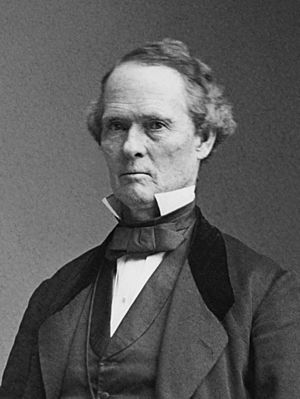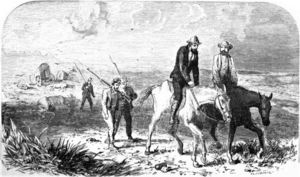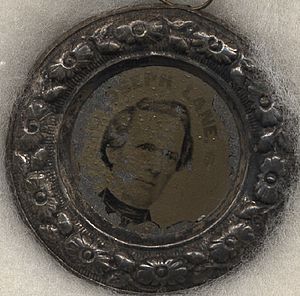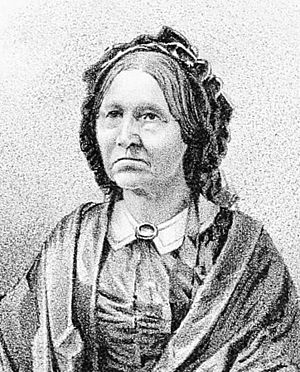Joseph Lane facts for kids
Quick facts for kids
Joe Lane
|
|
|---|---|
 |
|
| United States Senator from Oregon |
|
| In office February 14, 1859 – March 3, 1861 |
|
| Preceded by | Himself (Shadow Senator) |
| Succeeded by | James Nesmith |
| United States Shadow Senator from the Oregon Territory |
|
| In office July 5, 1858 – February 14, 1859 |
|
| Preceded by | Seat established |
| Succeeded by | Himself (U.S. Senator) |
| Governor of the Oregon Territory | |
| In office May 16, 1853 – May 19, 1853 Acting |
|
| Preceded by | John P. Gaines |
| Succeeded by | George Curry (Acting) |
| In office March 3, 1849 – June 18, 1850 |
|
| Appointed by | James K. Polk |
| Preceded by | George Abernethy |
| Succeeded by | Kintzing Prichette |
| Delegate to the U.S. House of Representatives from the Oregon Territory's at-large district |
|
| In office March 4, 1851 – February 14, 1859 |
|
| Preceded by | Samuel Thurston |
| Succeeded by | La Fayette Grover (Representative) |
| Personal details | |
| Born | December 14, 1801 Buncombe County, North Carolina, U.S. |
| Died | April 19, 1881 (aged 79) Roseburg, Oregon, U.S. |
| Political party | Democratic |
| Spouse | Polly Hart |
| Children | 10, including Lafayette |
| Relatives | Harry Lane (grandson) |
| Signature | |
| Military service | |
| Allegiance | |
| Branch/service | |
| Years of service | 1846–1848 |
| Rank | Brigadier General |
Joseph "Joe" Lane (December 14, 1801 – April 19, 1881) was an American politician and soldier. He served as a lawmaker in Evansville, Indiana, before becoming a general in the Mexican–American War. President James K. Polk later chose Lane to be the first Governor of the Oregon Territory. When Oregon became a state in 1859, Lane was elected as one of its first two U.S. Senators.
In the 1860 presidential election, Lane was nominated for vice president. He ran with John C. Breckinridge for the Southern part of the Democratic Party. Lane's support for slavery and his sympathy for the Southern states during the Civil War ended his political career in Oregon.
One of his sons later became a U.S. Representative, and a grandson became a U.S. Senator. This made Joseph Lane the head of an important political family in Oregon.
Contents
Early Life and Career
Joseph Lane was born in Buncombe County, North Carolina, on December 14, 1801. His family had English roots and had lived in colonial Virginia. His father, John Lane, fought in the American Revolutionary War. When Joseph was young, his family moved to Kentucky.
Lane left home at age 15 and got married four years later. In 1820, he moved to Evansville, Indiana. Joseph and his wife, Polly Hart Lane, had 10 children.
Joseph Lane mostly taught himself by reading books at night. During the day, he worked and saved money. He later bought a flatboat to transport goods on the Ohio River, which helped him become successful.
Lane was a good public speaker. This skill helped him get elected to the Indiana House of Representatives in 1822 when he was just 21. He served several terms there and later in the Indiana State Senate. He was also chosen as a captain in his local militia.
Service in the Mexican-American War
The Mexican–American War began in 1846. Lane left his State Senate job and joined a group of Indiana volunteers. He was elected as a Colonel in June 1846. Less than a week later, he was made a brigadier general of volunteers.
Lane and his Indiana troops went to Mexico. He fought bravely and was shot twice, though not seriously. In 1847, he was promoted to major general. He led the Indiana Brigade at the Battle of Buena Vista, serving under General Zachary Taylor, who later became president.
Lane also led a group that ended the Siege of Puebla. He defeated Antonio López de Santa Anna at the Battle of Huamantla.

Oregon Territory and Statehood
After Lane returned from Mexico, President Polk appointed him governor of the Oregon Territory. Lane received his official papers on August 18, 1848. He arrived in Oregon on March 3, 1849, after a difficult winter journey on the Oregon Trail.
When he reached Oregon City, Lane's first job was to count everyone living in the territory. This count showed 8,785 American citizens and 298 people from other countries. As Governor, Lane also served as the first leader for Native American affairs in Oregon.
One of Lane's early duties was to arrest five Cayuse Indians accused in the Whitman Massacre. The accused were brought to Oregon City for trial, found guilty, and hanged.
Lane resigned as territorial governor on June 18, 1850. On June 2, 1851, he was elected as Oregon Territory's Delegate to Congress. In May 1853, he briefly served as acting Territorial Governor for three days. Lane was re-elected as Delegate several times. When Oregon became a state in 1859, he was elected as one of its first two U.S. Senators.
Military Actions Against Native Americans
In 1853, after being re-elected as Delegate but before going to Washington, D.C., Lane was made a brigadier general. He commanded a group of volunteers to stop recent Native American attacks. Lane led his forces to southern Oregon to protect settlers and miners. He was wounded again in a fight at Table Rock, near today's cities of Medford and Central Point.
Lane also took part in the Rogue River Wars of 1855–1856. He was wounded in the shoulder during the Battle of Evans Creek.
Vice-Presidential Nomination and Political Decline
In 1860, the Democratic Party split over the issue of slavery. Democrats from the South left the national convention. They nominated their own candidates: John C. Breckinridge for president and Joseph Lane for vice president.
This "Southern Democrat" ticket lost the election. With this defeat and the start of the Civil War, Lane's political career ended. His support for slavery had already caused arguments in Oregon. His support for states leaving the Union was completely unacceptable.
On his last day in the Senate, Lane had a famous argument with Andrew Johnson of Tennessee. Johnson had spoken strongly for the Union and against states leaving. Lane accused Johnson of "selling his birthright" as a Southerner. Johnson replied that Lane was a hypocrite for supporting a movement that was actively against the United States.
Later Years and Legacy
In 1851, Lane claimed a piece of land about 1 square mile (2.6 km2) north of Roseburg, Oregon. He later bought a 2,000-acre (810 ha) ranch about 11 miles (18 km) east of Roseburg, which he later sold to one of his sons. Lane also built a home overlooking the South Umpqua River. After his Senate term, he retired there in 1861. Even though he openly supported the Southern rebellion in the Civil War, he stayed home on his ranch. He did not fight in the war or return to politics. In 1867, Lane was baptized as a Roman Catholic, and his family was raised in that faith. However, he gave up that faith shortly before he died.
Death and Legacy
Joseph Lane died at his home on April 19, 1881. He was buried in the Roseburg Memorial Gardens.
General Lane's daughter's home in Roseburg, where he spent a lot of time, is now a museum. It is cared for by the Douglas County Historical Society. This house is known as the Floed–Lane House and is listed on the National Register of Historic Places. However, the Floed-Lane House was never his main home.
Lane County, Oregon, is named after Joseph Lane. Joseph Lane Middle School in Roseburg and Joseph Lane Middle School in Portland are also named for him.
Lane's son Lafayette Lane served as a U.S. Representative from 1875 to 1877. Another son, John Lane, fought for the Confederacy in the Civil War. Lane's grandson Harry Lane was the mayor of Portland, Oregon, and then a U.S. Senator from 1913 until his death in 1917.
Images for kids
 | Isaac Myers |
 | D. Hamilton Jackson |
 | A. Philip Randolph |



